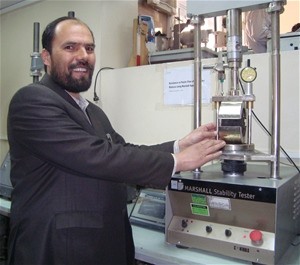
Engineer M. Eshaq, the senior lab manager at the Kabul Central Laboratory, demonstrates one of the quality control instruments that is used to test materials used in road construction and other infrastructure projects.
USAID/AIRP
A USAID-trained engineer opens a business and mentors university students.
“I understood that now is the time Afghans can start a business. We see the capability in ourselves. Before, we were not able to fulfill the requirements. Now, we can.”—Engineer M. Eshaq
13 JUNE 2010 | KABUL, AFGHANISTAN
Capacity building is a powerful tool for change. USAID is helping Afghans gain the skills to develop their country and pass on their expertise to the next generation of leaders. Engineer M. Eshaq’s experience shows that knowledge, determination, and vision will rebuild Afghanistan.
Almost 30 years ago, when Eshaq was in first grade, warring factions destroyed his school. Over the next five years, his parents and community members educated him to the best of their ability. By the time his family fled to Pakistan, he had learned enough to be placed in seventh grade. When he returned to Afghanistan, he finished high school in tents.
To obtain a university education, Eshaq successfully competed with 5,000 applicants for 300 seats. However, several months into the program, he realized that he needed more advanced instruction. He gave up his seat to transfer to another university that had better science labs and taught courses in English. In four years, he graduated with a degree in engineering.
Eshaq’s first engineering job was to help build a small clinic. That job led to building village roads. He soon began to work on major highway projects all over the country. He relished each challenge as an opportunity to grow.
A supervisor noticed that Eshaq was both meticulous in his work and a good teacher, and recommended him to the Kabul Central Laboratory operated by USAID’s Afghanistan Infrastructure Rehabilitation Program. There, as a senior lab manager, Eshaq conducted an array of quality control tests on road materials and taught more than 100 university interns.
After seven years, Eng. Eshaq decided to set out on his own. “I understood that now is the time Afghans can start a business,” he explained. “We see the capability in ourselves. Before, we were not able to fulfill the requirements. Now, we can.” Prepared with the technical and managerial skills to be successful, he bought equipment, hired employees, and began to answer requests for proposals.
When he won his first contract, he decided to share his skills with the next generation of Afghan professionals. He recruited university interns to work and learn in his lab. Three of them have graduated and found jobs. Proud of the impact he has had on the students’ skills and employment eligibility, Eshaq has already filed the papers to bring in a new group of interns.







Comment
Make a general inquiry or suggest an improvement.